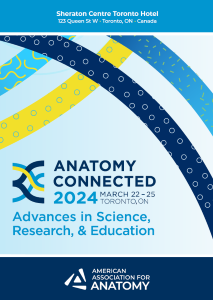Ethics Posters
Poster: Ethics Posters
107 - Sacred Choices and Willing Hearts: Exploring Spiritual Beliefs in Body Donation - A Cross-sectional Study of Nigerian Medical and Allied Health Students
Monday, March 25, 2024
10:15am - 12:15pm US EDT
Location: Sheraton Hall
Poster Board Number: 107
There are separate poster presentation times for odd and even posters.
Odd poster #s – first hour
Even poster #s – second hour
Co-authors:
There are separate poster presentation times for odd and even posters.
Odd poster #s – first hour
Even poster #s – second hour
Co-authors:
Jude Nnaka - Department of Anatomy, Faculty of Basic Medical Sciences, College of Health Sciences - Department of Anatomy, Faculty of Basic Medical Sciences, College of Health Sciences, Nnamdi Azikiwe University, Nnewi Campus, PMB 5025; Kingsley Ibeabuchi - Department of Anatomy, Faculty of Basic Medical Sciences, College of Health Sciences, Nnamdi Azikiwe University, Nnewi Campus, PMB 5025, Nnewi, Anambra State, Nigeria; Anatomy Unit, Nursing Department, Claretian University, Nekede, Imo State, Nigeria; Anatomy Unit, College of Nursing Sciences, Our Lady of Lourdes Hospital,; Victor Ezeike - University of Abuja Teaching Hospital; Muritala Suleiman - Department of Anatomy, Faculty of Basic Medical Sciences, College of Health Sciences, - Department of Anatomy, Faculty of Basic Medical Sciences, College of Health Sciences, Kogi State University; Ojo Gbadegesin - Evangel Theological Seminary, Jos, Plateau State, Nigeria;Southwest Advanced School of Theology,; Izuchukwu Okafor - Department of Anatomy, Faculty of Basic Medical Sciences, College of Health Sciences - Department of Anatomy, Faculty of Basic Medical Sciences, College of Health Sciences, Nnamdi Azikiwe University, Nnewi Campus, PMB 5025
- SM
Smart I. Mbagwu
Nnamdi Azikiwe University
Nnewi, Anambra, Nigeria
Presenting Author(s)
Abstract Body : Introduction
The correlation between spirituality and body donation remains insufficiently investigated. This study examined the spiritual viewpoints of students and assessed how these attitudes influence their willingness to donate their bodies for educational or research purposes.
Methods
This cross-sectional study examined 1158 Nigerian medical and allied health students who have undergone cadaver dissection. The study was conducted using an online questionnaire that was created based on interviews and the Spirituality Orientation Inventory. The questionnaire included inquiries about spiritual beliefs, willingness to donate their bodies, and reasons for body donation. The study employed descriptive analysis and Chi-squared tests to ascertain the proportions and connections among the variables under investigation. Statistical significance was set at p< 0.05.
Results
A notable proportion of students, comprising 15.2%,were unfamiliar with the concept of body donation, while 35.23% expressed support for it and 49.49% remained neutral. A significant majority (63.65%) rejected the notion of postmortem body donation. A comparatively small subset of students (17.62%) expressed a willingness to consider body donation for educational or research purposes, or if personal benefits were involved (10.49%). Significantly, 56.24% of the students affirmed adherence to the teachings of their respective religions. Additionally, a substantial 76.37% of the students believed in life after death, with 40% expressing uncertainty regarding reincarnation, and 54.28% displaying a lack of awareness regarding their religious doctrines on the matter of body donation. Gender showed no significant correlation with willingness to donate (p = 0.066), but belief in reincarnation was associated with a greater inclination to donate (p = 0.026).
Conclusion.
The level of awareness on body donation among medical students in Nigeria is inadequate. A considerable proportion of students lack awareness regarding their religion's stance on the matter of body donation and may have formed their opinions regarding body donations for motives unrelated to spirituality.
The correlation between spirituality and body donation remains insufficiently investigated. This study examined the spiritual viewpoints of students and assessed how these attitudes influence their willingness to donate their bodies for educational or research purposes.
Methods
This cross-sectional study examined 1158 Nigerian medical and allied health students who have undergone cadaver dissection. The study was conducted using an online questionnaire that was created based on interviews and the Spirituality Orientation Inventory. The questionnaire included inquiries about spiritual beliefs, willingness to donate their bodies, and reasons for body donation. The study employed descriptive analysis and Chi-squared tests to ascertain the proportions and connections among the variables under investigation. Statistical significance was set at p< 0.05.
Results
A notable proportion of students, comprising 15.2%,were unfamiliar with the concept of body donation, while 35.23% expressed support for it and 49.49% remained neutral. A significant majority (63.65%) rejected the notion of postmortem body donation. A comparatively small subset of students (17.62%) expressed a willingness to consider body donation for educational or research purposes, or if personal benefits were involved (10.49%). Significantly, 56.24% of the students affirmed adherence to the teachings of their respective religions. Additionally, a substantial 76.37% of the students believed in life after death, with 40% expressing uncertainty regarding reincarnation, and 54.28% displaying a lack of awareness regarding their religious doctrines on the matter of body donation. Gender showed no significant correlation with willingness to donate (p = 0.066), but belief in reincarnation was associated with a greater inclination to donate (p = 0.026).
Conclusion.
The level of awareness on body donation among medical students in Nigeria is inadequate. A considerable proportion of students lack awareness regarding their religion's stance on the matter of body donation and may have formed their opinions regarding body donations for motives unrelated to spirituality.


